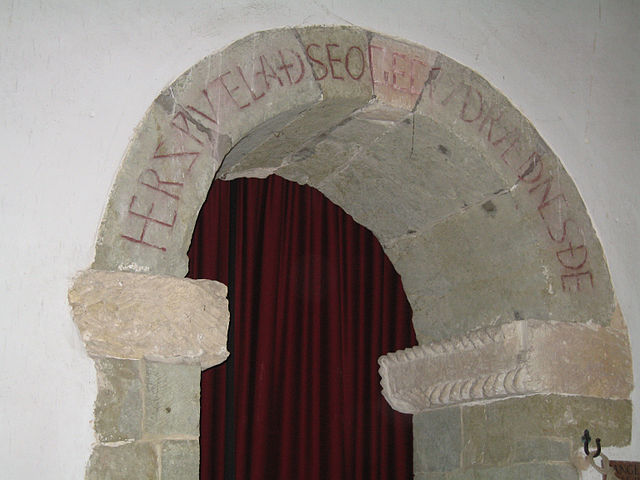Scribal abbreviations or sigla are abbreviations used by ancient and medieval scribes writing in various languages, including Latin, Greek, Old English and Old Norse.
Malmesbury Abbey early 15th-century Latin Vulgate Bible manuscript of Book of Numbers 1:24-26 with many abbreviations, 1407. Lines 2 and 3 with expansions between [..]: g[u]lor[um] a vigi[n]ti a[n]nis [e]t sup[ra] o[mn]es qui ad bella p[ro]cedere[n]t: ((verse 25)) q[ua]dragi[n].
Entries for Croydon and Cheam, Surrey, in Domesday Book (1086), as published using record type in 1783.
Image: Notaelatinae 01
Image: Notaelatinae 02
Old English, or Anglo-Saxon, is the earliest recorded form of the English language, spoken in England and southern and eastern Scotland in the early Middle Ages. It developed from the languages brought to Great Britain by Anglo-Saxon settlers in the mid-5th century, and the first Old English literary works date from the mid-7th century. After the Norman Conquest of 1066, English was replaced for several centuries by Anglo-Norman as the language of the upper classes. This is regarded as marking the end of the Old English era, since during the subsequent period the English language was heavily influenced by Anglo-Norman, developing into what is now known as Middle English in England and Early Scots in Scotland.
Alfred the Great statue in Winchester, Hampshire. The 9th-century English King proposed that primary education be taught in English, with those wishing to advance to holy orders to continue their studies in Latin.
Her sƿutelað seo gecƿydrædnes ðe ('Here the Word is revealed to thee'). Old English inscription over the arch of the south porticus in the 10th century St Mary's parish church, Breamore, Hampshire
The first page of the Beowulf manuscript with its opening Hƿæt ƿē Gārde/na ingēar dagum þēod cyninga / þrym ge frunon... "Listen! We of the Spear-Danes from days of yore have heard of the glory of the folk-kings..."







